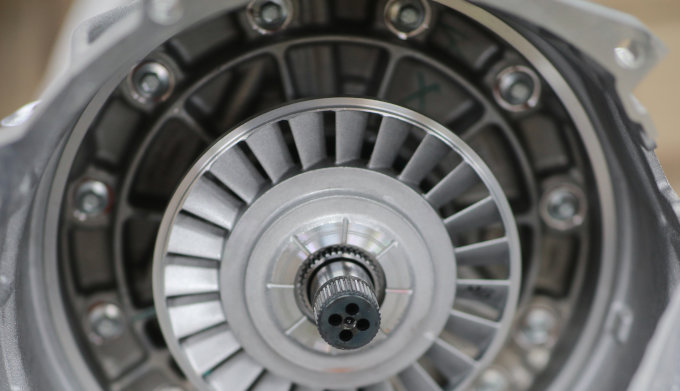Your vehicle’s transmission is a complex system, with the torque converter playing a crucial role in ensuring smooth power transfer from the engine to the transmission. Like the clutch system in manual transmissions, the torque converter in automatic transmissions can experience issues due to lack of maintenance, age, and unforeseen damage. Regularly checking and maintaining your transmission system is vital to avoid detrimental effects on the torque converter.
Table of Contents:
- Understanding the Torque Converter
- Common Causes of Torque Converter Failure
- Signs of a Failing Torque Converter
- Consequences of Ignoring Torque Converter Issues
- Preventive Measures and Maintenance Tips
- Professional Services at AAMCO SoCal
- Conclusion
Understanding the Torque Converter
The torque converter is a fluid coupling device that connects the engine to the transmission in automatic vehicles. It allows the engine to keep running while the vehicle is stationary, and smoothly transfers power to the transmission as the vehicle accelerates. Unlike the clutch system in manual transmissions, which manually disconnects the engine from the transmission, the torque converter automatically adjusts to provide seamless power delivery.
Common Causes of Torque Converter Failure
Several factors can lead to torque converter failure:
- Lack of Maintenance: Neglecting regular maintenance can lead to contaminated or low transmission fluid, which is essential for the torque converter’s operation.
- Age and Wear Over Time: As with any mechanical component, the torque converter can wear out over time, especially if it hasn’t been properly maintained.
- Contaminated or Low Transmission Fluid: Dirty or insufficient fluid can cause overheating and damage to the torque converter.
- Overheating: Excessive heat can damage the torque converter’s internal components.
- Mechanical Damage: Accidents or rough driving can cause unforeseen damage to the torque converter.
Signs of a Failing Torque Converter
Recognizing the signs of a failing torque converter can help you address issues before they become severe:
- Shuddering or Shaking During Acceleration: If you feel a shudder or shake when accelerating, it could indicate a torque converter problem.
- Delayed or Rough Shifting: Difficulty or delays in shifting gears can be a sign of torque converter issues.
- Unusual Noises: Whining, grinding, or other unusual noises from the transmission area can signal a problem.
- Transmission Slipping: If your transmission slips out of gear, it may be due to a failing torque converter.
- Overheating Warning Signs: Overheating can damage the torque converter, so be alert to any signs of excessive heat.
Consequences of Ignoring Torque Converter Issues
- Ignoring torque converter issues can lead to severe consequences:
- Increased Damage to the Transmission System: A failing torque converter can cause additional stress and damage to the entire transmission system.
- Higher Repair Costs: Addressing issues early can save you from costly repairs or even the need for a complete transmission replacement.
- Potential for Complete Transmission Failure: Neglecting a failing torque converter can result in total transmission failure, leaving you stranded and facing significant repair bills.
- Impact on Vehicle Performance and Safety: A malfunctioning torque converter can affect your vehicle’s performance and safety, making driving hazardous.
Preventive Measures and Maintenance Tips
To keep your torque converter and transmission system in good shape, follow these preventive measures:
- Regular Transmission Fluid Checks and Changes: Ensure your transmission fluid is clean and at the correct level.
- Using the Correct Type of Transmission Fluid: Use the fluid recommended by your vehicle manufacturer to avoid compatibility issues.
- Installing a Transmission Cooler: A cooler can help manage heat and prevent overheating.
- Scheduling Regular Transmission Inspections: Regular check-ups by a professional can catch issues early.
- Addressing Issues Promptly: Don’t ignore warning signs; addressing them promptly can prevent further damage.
Professional Services at AAMCO SoCal
At AAMCO SoCal, our experienced technicians specialize in torque converter inspections and repairs. Our comprehensive maintenance services are designed to keep your transmission and torque converter in top condition, ensuring your vehicle runs smoothly and reliably.
Conclusion
Maintaining your torque converter is crucial for the overall health of your transmission system. By adopting preventive measures and seeking professional services when needed, you can avoid the high costs and potential dangers associated with torque converter failure.
If you suspect issues with your torque converter or simply want to ensure your transmission is in good shape, contact AAMCO SoCal today. Schedule an appointment online to keep your vehicle running smoothly and safely!

 Schedule Appointment
Schedule Appointment















